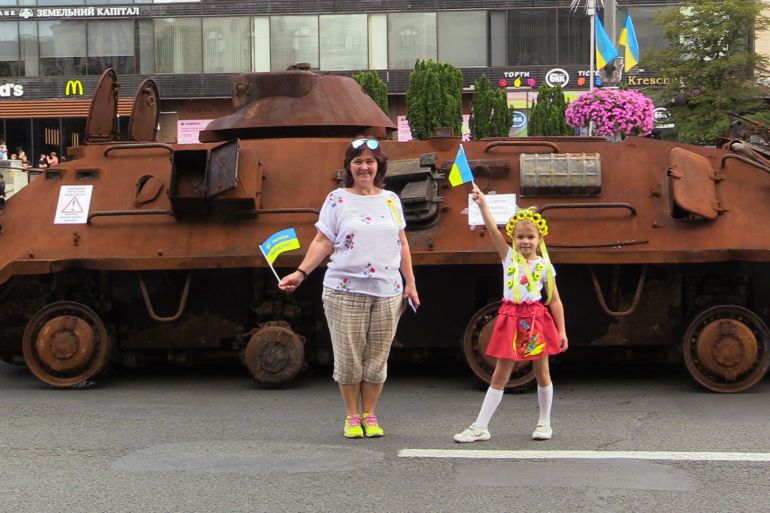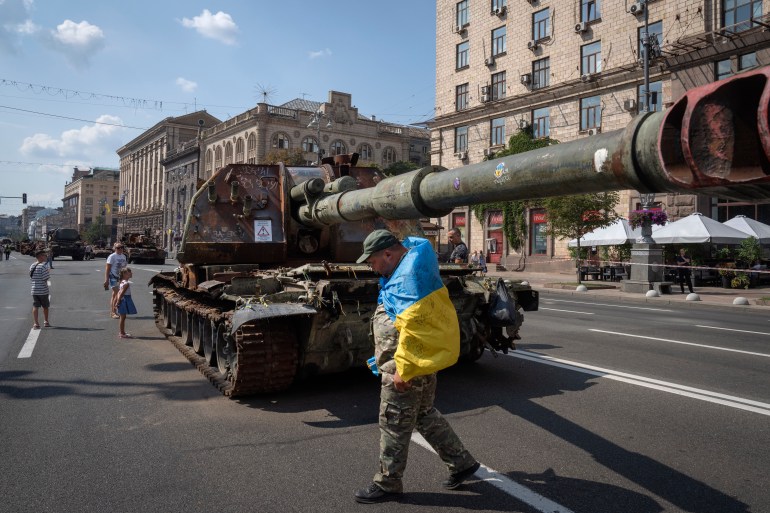Ukrainians express fear and hope as Russia’s war rages on Independence Day
Ukraine declared independence from the Soviet Union on August 24, 1991.

Kyiv, Ukraine – Thirty-two years have passed since Ukraine gained independence from the Soviet Union.
With the country now at war with Russia, Al Jazeera spoke to several Ukrainians about what the anniversary on Thursday means to them:
Keep reading
list of 3 itemsUkraine: Ground Zero
Ukraine ‘sky shield getting stronger’ as allies supply coveted F-16s
‘We will stand until the end to liberate Ukraine within its 1991 borders’
Yevhen Averkin, 35, a serviceman since 2014:
I was very small on the first Independence Day. I was three. The Independence Day I remember the most is in 2009. I took part in a parade on the Independence Day during my military service.
What’s utterly important is that our next generation grows up in peace without knowing what war is, so that they have real freedom of speech, so that our nation flourishes without corruption, without oligarchs. And we need to work on our victory.
The most bitter thing for me is losing my brothers in arms. Since 2014, when the war began, I fought in the Donbas region. Then we were stationed in Henichesk [in the Kherson region near Russian-annexed Crimea].
Since last year, we were advancing in Kherson, liberated it. Then we fought in [the eastern towns of ] Bakhmut, Soledar, Kurdiumivka, Bakhmut again, Vasuikivka, and now we are in the Zaporizhia direction, moving towards [the Russian-occupied town of] Tokmak. The day before yesterday, we liberated [the village] of Rabotino.
No one knows for real when we’ll have won. Soldiers don’t win wars. Politicians do. Only they know when they meet and agree and we will finally see peace. But there’s one thing I can say – we will stand until the end to liberate Ukraine within its 1991 borders.

‘We want to live the way we did before the war’
Larysa Averkina, 29, Averkin’s wife:
The most bitter thing is when my child is growing up without a father, when he watches the news and says, “My dad is a hero. My father defends Ukraine.”
Independence is when a person is free, when one has their values, can convey their words, express themselves without fear. When things are peaceful.
When you are not afraid to go out without being afraid of what’s awaiting you outdoors, whether there is shelling today or not, whether you are alive today or not. We want to live the way we did before the war – in freedom, in peace.”
‘It was a desperate jump over the abyss to the freedom we dreamed about’
Svetlana Chunikhina, vice president of the Association of Political Psychologists:
I remember the [failed August 18-21, 1991, Communist] putsch in Moscow very well – to be more precise, the depressing impression it made on my parents. In my youth, I perceived politics in Ukraine as “moonlight”, as a reflection of what was happening [in Moscow], in the former metropolis.
But as I began to deal with the psychology of politics professionally, the real picture of what happened on August 24, 1991, began to gradually open up to me. Ukraine’s independence was not written in the scenarios of the global historical process at the time. Its value was not 100 percent obvious either for Ukrainians or for its neighbours. No one and nothing guaranteed the independence.
It was a desperate jump over the abyss to the freedom we dreamed about. I share the view of [American historian] Timothy Snyder. He speaks of Ukrainian statehood as history being made right now, live, at the cost of our lives. And now the situation is such that Ukraine’s freedom is a prologue to the freedom of the [European] continent and the world as a whole from the new dark ages of tyranny.
‘Before 2014, I had been feeling like a Russian living in Ukraine’
Antonina, 80, lived in Russia until 1994:
When [the 1991 Communist putsch] failed, everyone sighed with relief because all of that was incomprehensible and frightening.
Then survival began. At the time, [politicians] were saying, “We’ll be on our own. We will live well.” I didn’t believe in it at the time.
In 2014 [after the pro-Western Maidan revolution], I felt I was Ukrainian. Before that, I had been feeling like a Russian living in Ukraine – that it’s my country, that I hurt for it, that it’s mine, that I have to stand for it.
On the first day of the war [on February 24, 2002], I sent a text [to my nieces in Russia], so that they learned about it from me, not from television, not from the [official] lies.
I told them, “It’s such a pity that you don’t come out to rally in protest,” and one of them said, “Unfortunately, we can’t. It’s forbidden.” And the second niece who’s a bit older said she didn’t get any messages [about the war]. These days, they don’t believe me.

‘The dream we always had’
Svetlana Ivanova, 65:
Ukraine’s independence was the dream we always had – to be independent, to be strong, not to rely on anyone, to do the best you can for yourselves, for others.
I don’t remember the very first day of independence, but I remember the feeling of that time. A child is born, and everything about it is in the future. It may grow into a strong, beautiful person, and everything depends on us, on how we raise this child. [I remember] the feeling of future happiness.
I was on the Maidan [Kyiv’s Independence Square during the anti-Russian revolt of 2013-2014]. I was building barricades, and when [pro-Russian President Viktor Yanukovych’s troops] used water cannons against us, [other protesters] asked me, “Lady, step aside please.”
I cooked for them, and during the shooting on February 19, [2014, which killed 25 people,] I rushed to help the wounded. I am not a doctor, but I helped.
In those days, I saw how old ladies would bring something. Everyone brought anything they could. I was proud of being Ukrainian and that this is my motherland, my nation.
[When the war began,] I had no fear – when [my neighbours] were looking for spies, when somebody called the police saying, “There’s someone suspicious sitting outside.”
I live on Lesya Ukraininka Boulevard [in downtown Kyiv]. There was commotion around us, but there was no fear. I had a feeling that we’re succeeding, that we’re moving forward.
But now, I have a feeling that we’re losing ground. We need the support of other nations, but at the time when we have to focus everything on the victory, there are these delays.
I feel that people don’t understand that our destinies are being determined – that, I beg your pardon, our behinds are on fire, that nothing has been set in stone and that our boys get killed [on the front lines] to protect us.
When the war began, we pitched in. We lived like a big commune. And now, there’s a feeling that everything is over, that they won the war. There’s no victory yet. The most difficult part is ahead of us.
We’re at a crossroads. There’s no return to the past.

‘For my family, Ukraine’s Independence Day is full of personal symbolism’
Nadia Gordiyuk, a community activist from the town of New York in the Donetsk region who was a volunteer at the 1991 referendum on Ukraine’s independence:
I am 60 years old. I must be a typical product of Homo Sovieticus because I lived my entire life in the Donetsk region at the very centre of the Donbas, which was Russified at the time.
I went to a Russian-language school in the town of New York. In 1951, Soviet authorities prudently and secretly removed the name, replacing it with the neutral and faceless Novgorodskoye. And from the school’s windows one could see the buildings of [the town of] Horlivka, which is now occupied by Russians.
But the outlook formed by my secondary school changed dramatically when I entered the Sloviansk Pedagogical Institute in 1980 in the very town of Sloviansk, from where the Russian aggression in eastern Ukraine began [in April 2014 when Russian “volunteers” seized it].
Even then, during [Soviet leader Leonid] Brezhnev’s “prosperous times”, there where teachers of Ukrainian language and literature and even Communist history who taught their students to look at Ukrainian history not in accordance with the Communist Party textbooks and half-whispered the real history of Ukraine to us.
That is why on January 21, 1990, when I was in Kyiv for professional training, I heard about the “Live Chain” rally organized by the [pro-independence] People’s Movement of Ukraine.
I didn’t hesitate to join the rally, which became one of the most important steps towards the restoration of Ukraine’s statehood. [Hundreds of thousands of] people joined hands to demonstrate the unity of Ukraine on the way to independence.
That’s why back in my New York, I actively participated in the organisation of the December 1, 1991, survey and referendum when many compatriots supported the Declaration of Independence with their signatures.
We collected signatures independently, without asking for the consent and help of local authorities. It wasn’t politicians who decided to declare Ukraine’s independence. It was the people [who voted] at the all-Ukrainian referendum.
There was only one question on that piece of paper: “Do you confirm the act of proclamation of the independence of Ukraine?” More than 90 percent of Ukrainians from various regions responded positively. I’m proud that my compatriots [from New York] were among them.
For my family, Ukraine’s Independence Day is full of personal symbolism. It was on this day in 2005 when my father, who hoped for the revival and prosperity of Ukraine his entire life, passed away.
For many days, he was between heaven and earth, but he passed away on this particular day. He waited [to die] on his favourite holiday, the one he’d been anticipating his entire life. For me, it’s a symbol that despite all the hardship and trouble, Ukraine would live to see its victory and prosperity.